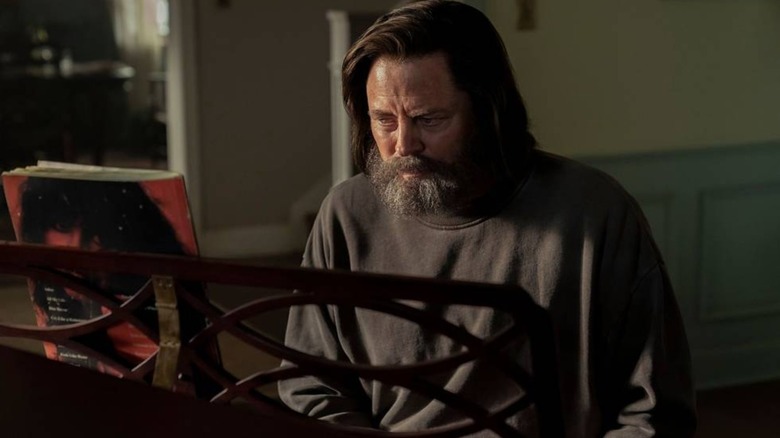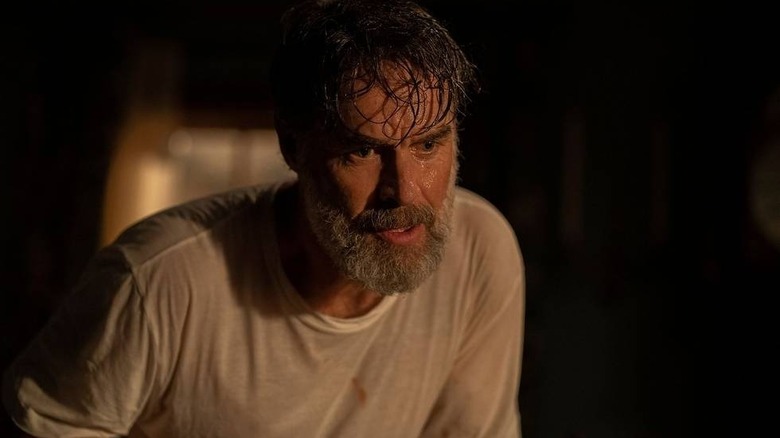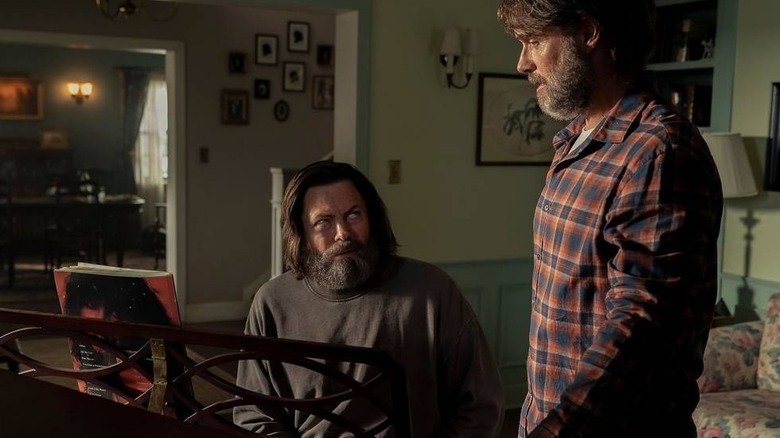The Last Of Us Episode 3 Brings The Tears
"The Last of Us," both the award-winning game and the fantastic live-action adaptation, is not only a horror story, and not only a zombie story with plenty of action, but also a tear-jerking drama with compelling characters. While this show (or the game) doesn't particularly revolutionize the zombie genre with one single aspect, it introduces enough little variations that build up into a phenomenal zombie story.
After last week brought the sheer horror of a mushroom apocalypse, episode 3 brings back the tears. It reminds us that this is a drama after all, in what is without a doubt the best episode of the season so far.
We don't start with a flashback, but with an emotional pay-off to last week as Joel makes a little cairn memorial for Tess. He is mad at Ellie, but she rightfully proclaims that she is not at fault for Tess' death. She and Joel made a choice to take her in willingly and for their own benefit.
Also in this section, we get more of the fantastic bickering dynamic between Joel and Ellie, how much they annoy and they understand each other. Ellie knows she is annoying Joel and she is a handful, but she finds great joy in it as well and knows when to stop. While Pascal's performance as Joel is terrific, and quickly stands out as being more than just a repeat of "The Mandalorian," it is Bella Ramsey as Ellie who truly makes this story special. As a girl born after the world ended, it's a delight to see her react with awe and wonder at things from the old world, like video games and planes — her "dude, you got to go up in the sky" directed at Joel is absolutely hysterical and also laden with deep melancholy for a world she never knew.
Surviving versus living
Though we don't start with one, we do get a flashback — a device that is quickly becoming the show's best weapon. We flashback to the early days of the outbreak, when the newly-founded FEDRA (Federal Disaster Response Agency) went from town to town evacuating people — and executing them if they couldn't fit a QZ. Watching them from a distance, and avoiding a tragic end, is Bill (Nick Offerman), a doomsday prepper with a basement full of guns and ammo and a big smile at finally being proven right when the world ends.
From there, the episode is practically entirely devoted to Bill's story, how he spent the first few years of the apocalypse living in his own little "Last Man on Earth" bubble, and how everything changed when he met Frank (Murray Bartlett). Once again, "The Last of Us" proves to be at its very best when moving away from Joel and Ellie (even if they rule) to paint an image of how the outbreak affected others. Here, we see how the world changed through the eyes of Bill, and how he himself came to change and believe in something even after the world had given him every reason to give up.
Bill and Frank's little neighborhood becomes a bubble for how things changed across the last 20 years, from the initial horror of the military taking over, to the rise of mistrust and raiders becoming an even bigger problem than the infected, to the government becoming filled with literal Nazis. It is a smart move for an episode that's about finding meaning and hope in life after you think it is all gone. It also portrays the slow fall of humanity which we don't usually see in zombie stories, which just skip to the post-apocalypse.
Married Life
The biggest surprise of the episode, of course, is that Frank, the sketchy survivor who just shows up at Bill's doorstep one day doesn't turn out to be a raider or a thief, but instead he becomes Bill's partner for almost 20 years. The episode drastically changes the two characters' storyline in the game and does it better.
The game did show that Bill and Frank were together, but we only got to see the end of their relationship, an ugly, heartbreaking ending that matched the bleak and generally hopeless tone of the rest of the game. The two meet a tragic, but loving ending in each other's arms, after years of bliss. What makes the scene and the episode fascinating is that it manages to still present a rather tragic and dark ending to the two characters, while fundamentally changing the tone for the better.
"The Last of Us" is still a dark post-apocalyptic world with no hope to cure any disease, a world where it is incredibly hard to make anything good last, where it is nearly impossible to find someone to care about, let alone love. And when you do find it, it is hard to see any hope for yourself once that person is gone. And yet, the sweet and heartwarming ending to Bill and Frank shows that it is worth surviving because eventually you might start actually living.
Just like Bill, a man who didn't care about anything or anyone, found hope and love again, so can Joel. Here's someone who had given up on the world before it even ended, finally embracing his purpose — to bring Ellie to the Fireflies with the hope of developing a miracle cure to the infection.


